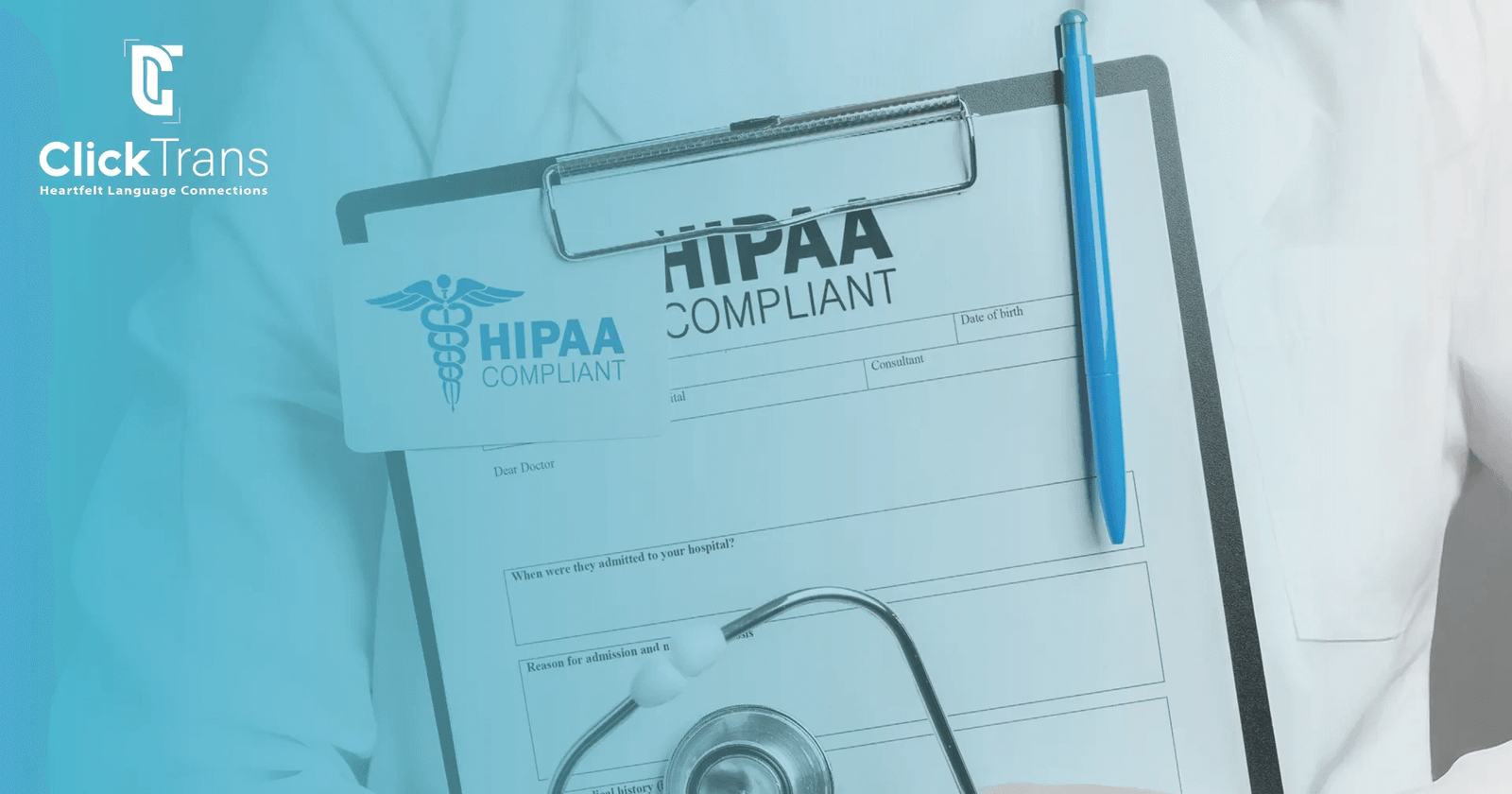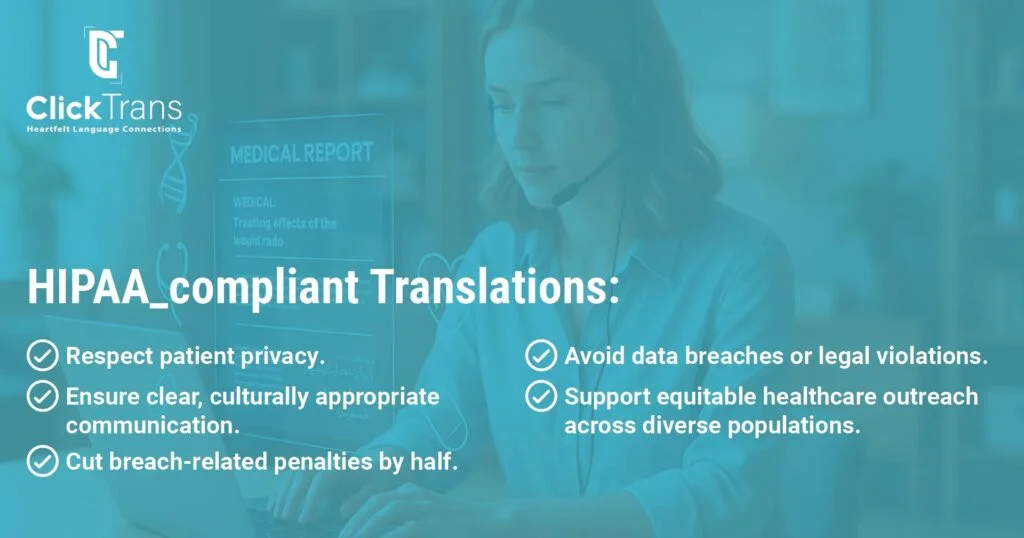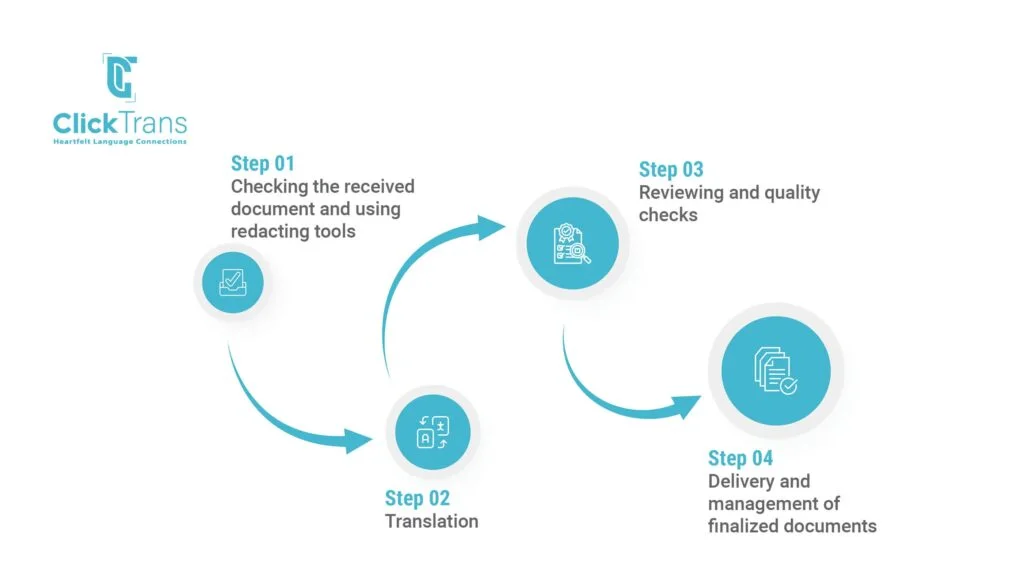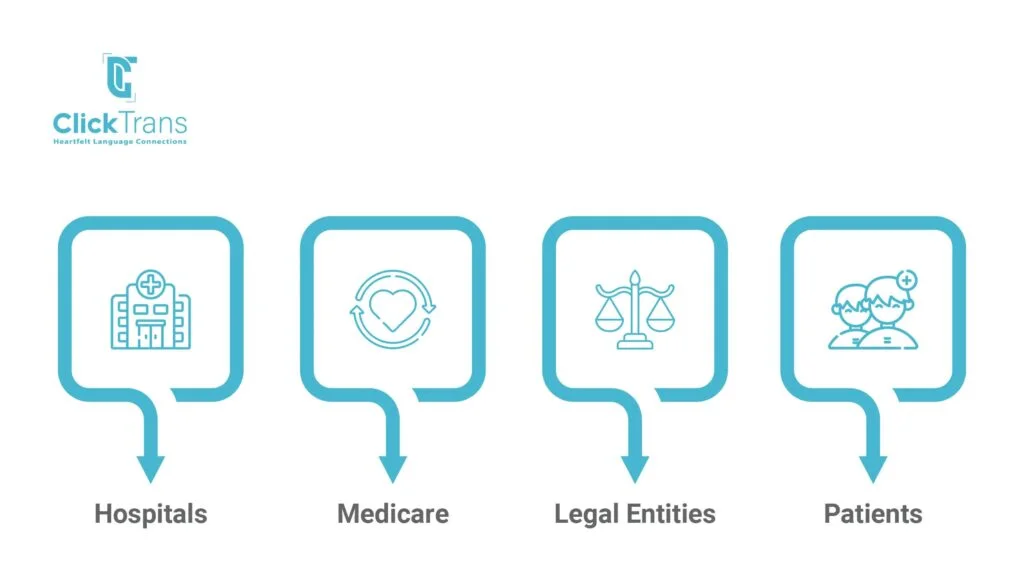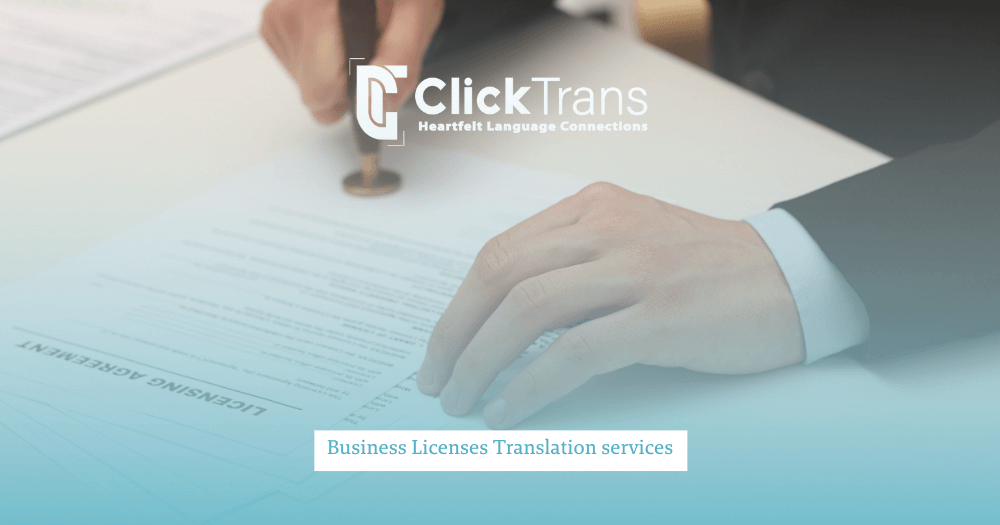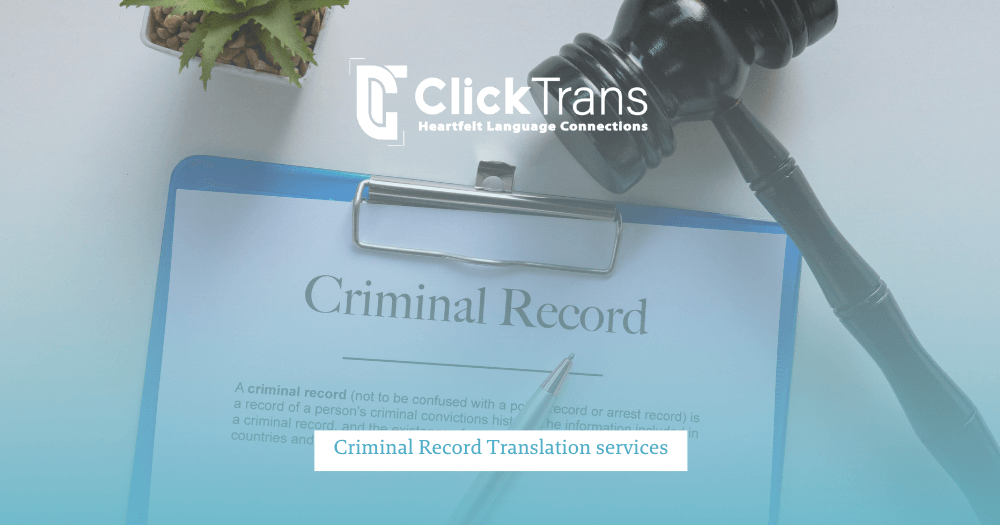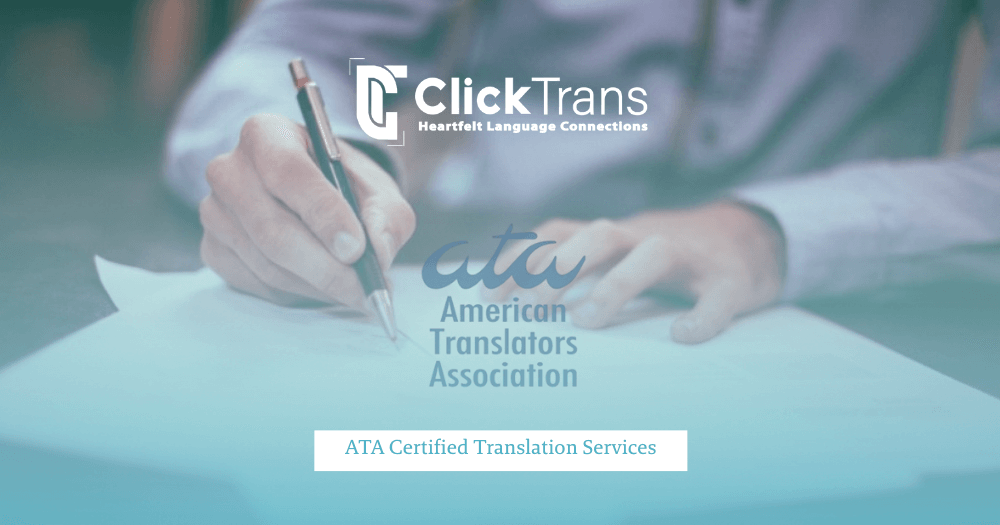Table of Contents
Access to medical records is something we feel sensitive about, and that is our right. We always want to ensure that only authorized professionals have access to them so that our privacy is protected. Luckily, laws and regulations that govern the medical terrain exist. But what would be the case if we need to have our medical documents translated into other languages?
This is where hipaa-compliant translation services comes in.
What Are HIPAA-Compliant Translation Services?
The Health Insurance Portability and Accountability Act (“HIPAA”) is a set of strict privacy laws to protect patient data that was introduced in 1996 by the American Standards for Privacy of Individually Identifiable Health Information (known as “Privacy Rule”).
To understand the full scope of HIPAA protections and rules, you can visit the official HIPAA page by the U.S. Department of Health and Human Services (HHS).
Healthcare institutions and facilities primarily and heavily work with such Protected Health Information (PHI), they must comply with the HIPAA’s Privacy Rule.
HIPAA-compliant translation services ensure that translations of medical documents are all compliant. For such a reason, HIPAA-compliant translators must sign Business Associate Agreements (BAAs) which are legal agreements that legally bind them to keep patient data confidential.
Accordingly, HIPAA translators apply very strict security measures, establishing advanced security protocols (like TLS 1.3+ for end-to-end encryption of digital documents or higher), tracking edits (providing audit trails), and storing data securely.
As for translation providers, they make sure to avoid crowdsourcing unpaid or paid training or non-professional translators as they might lack security audits and control, which poses a threat of HIPAA breaches.
HIPAA-compliant translation services cover a wide range of applications that are used to handle and process health information, such as:
- Medical document translations that include patient records, informed consent forms, and clinical trial reports.
- Medical interpretation, such as conversations between doctors and their patients, either in person, via video, or over the phone.
- Transcription services, such as converting audio recordings of medical consultations, dictations, or procedures into written text, often followed by translation if needed.
- Health education materials, such as brochures or flyers explaining medical conditions or treatment procedures for patients.
- Health insurance documents, such as insurance policies or claim forms.
How HIPAA Translation Services Ensure Data Security and Compliance
HIPAA-compliant translation services follow a clear and structured process to protect sensitive health information while translating medical documents. This starts with reviewing the documents carefully to check whether they contain any sensitive health information requiring special protection.
Then, redacting tools are used to remove personal details, such as names or Social Security numbers, from the documents. This step reduces the risk of exposing sensitive information by automatically hiding data that could identify a patient, making the translation process safer.
The documents are then sent to translators through secure channels and stored on servers that meet HIPAA standards in order to limit access to authorized personnel only. On the other hand, translators should be trained to handle health information according to HIPAA rules and be skilled in medical terminology to deliver accurate translations.
They should work in secure settings using encrypted computers or private networks, to keep the documents confidential.
After translation, the documents go through a detailed quality check by trained reviewers to ensure accuracy and security compliance. If personal information was removed earlier, it’s reinserted into the translated document after thorough checks to prevent leaks.
The final translated documents are delivered to the client using the same secure, encrypted channels, guaranteeing they arrive safely without any breaches.
After delivery, the documents are managed according to HIPAA guidelines. If they need to be kept, they’re stored on secure servers with ongoing protection.
If they need to be disposed of, they’re securely deleted using methods that prevent recovery, like data wiping. This thorough process ensures that health information stays protected at every step, from start to finish, while building trust with clients and patients.
Who Needs HIPAA-Compliant Translation Services?
HIPAA-compliant translations is essential for a wide range of individuals and organizations that handle protected health information and need to translate this information in a secure manner that complies with HIPAA. These groups include, but are not limited to:
- Hospitals & Clinics in countries with huge foreign populations need HIPAA translations services all the way. They have to ensure reliable and secure translations for all their medical forms, consent forms, prescriptions, reports, discharge summaries, clinical trials, reports, questionnaires, etc. and also to protect their patients who participate in global studies.
- Clinical Trial Sponsors because they handle confidential patient data across borders. HIPAA compliance will eliminate regulatory violations and help protect participants’ data.
- Telehealth Platforms refer to every digital system, platform, or applications that facilitate remote medical services, such as medical translation services online. In 2022, 42% of telehealth providers reported translation-related breaches.
- Medical Device Manufacturers: According to U.S. Food and Drug Administration (FDA), all manufacturers must ensure that their user manuals are translated for non-English markets to protect PHI and guarantee unification in global post-market phases.
- Public Health Agencies for their multilingual contact tracing in LEP communities. They need HIPAA-compliant translation to keep LEP patients well-informed about their health updates, follow-up procedures, and rights as well as disease tracking.
- Pharmacies: 30% of the medication errors suffered by LEP patients have been traced to non-compliant translation of medical labels.
- Private Insurance Companies for their health insurance plans
- Government Insurance Programs such as Medicare and Medicaid.
- Law firms or legal entities that work in the medical or healthcare field
- Patients themselves (or their legal representatives) as they need medical reports translated for various purposes like medical tourism, asylum or immigration applications, legal or insurance proceedings, filing complaints or appeals with health authorities, etc.
Did you know 67% of U.S. hospitals care for Limited English Proficiency (LEP) patients?
Top Benefits of Using HIPAA-Compliant Language Services in Healthcare Facilities
Deploying HIPAA-compliant language services does not only check standardization and boost your reputation as an institution that works in the medical field. In fact, such practices improve care quality, cut costs, streamlines administrative tasks, and even pave way for faster audit preparation (up to 65%).
According to a Harvard Medical School study, published in 2021, it has been proven that HIPAA-compliant language solutions reduce medical errors. These solutions helped prevent up to 35% of the misdiagnoses LEP patients previously endured.
Subsequently, they also lowered breach risks. In some cases, healthcare providers also reported a 50% reduction in PHI-related fines, according to the 2022 OCR Audit Report. For example, any use of an unsecure public translation service (such as Google Translate) with PHI documents may be considered a HIPAA violation.
As a result, HIPAA-compliant language services are shown as healthcare entities hero. It enhances patient trust! Some clinics even reported up to 89% return rate among LEP patients due to the reliable translations.
While hospitals reported reduced readmission rates, which is a sign that LEP patients fully understand and correctly follow the aftercare instructions. Therefore, they do not need to revisit the hospital after being after being discharged.
If you haven’t checked, our blogs cover real-life medical failures caused by wrong translations from around the globe. Figure out here how medical translations can really take people to hospital and even to court!
What Does PHI Stand for in HIPAA
The law defines protected health information (PHI) as any unique or traditional identifying information about an individual’s health, treatments, or payments. This applies to all information regardless of its form (paper, electronic, or verbal).
In other words, Protected Health Information (PHI) indicates any individually identifiable health data (e.g., personal information, diagnoses, medication plans, billing records, lab results). It covers a vast array of records, encompassing oral and written communications as well as their translations.
Therefore, under the HIPAA Act, all PHI information must be protected to ensure the privacy and security of patient data.
According to HIPAA, the PHI scope entails 18 identifiers. They include:
- Detailed geographical data and dates (e.g., birthdays, admission and dismissal dates).
- Non-obvious Identifiers like vehicle plate numbers, device IDs, and biometric data (e.g., photographs, blood type, and fingerprints).
- Digital PHI such as wearables metadata (e.g., digital watch results on heart rates, activity levels, etc.) only when linked to a patient identity.
Common Mistakes to Avoid When Choosing a Medical Translation Provider
Choosing a medical translation provider these days involves significant risks. Today, more people find it easy to enter the field, lacking the necessary certifications, training, and surely experience. What even complicates it further is the careless and unqualified use of AI, which not only compromises quality but also poses serious risks to confidentiality that is often overlooked!
Did you know uncertified “bilingual” translators are the reason behind 34% of the medical translation errors?!
(JAMA Network Open, 2021)
Here are some mistakes you must avoid:
-
Not ensuring HIPAA compliance
Choosing a provider that does not offer a Business Associate Agreement (BAA) and does not implement the necessary health information protection controls could expose the facility to legal violations and fines if patient data is leaked.
-
Relying on free machine translation services (such as Google Translate or DeepL)
These tools sometimes retain content or use it to train their systems, which could be a direct violation of HIPAA. That is why it is recommended to use paid, encrypted translation tools that are authorized for use in healthcare settings, such as the tools we use in ClickTrans.
-
Not verifying a translator’s background or medical experience
Hiring translators who lack the knowledge of medical terminology or experience in PHI documents translation may lead to errors in or loss of clinical meaning.
-
Transferring or storing documents insecurely
Sending files via unencrypted email or storing them on unprotected personal devices raises the risk of data loss or breach. Use encrypted file exchange systems and ensure that the provider has secure storage policies in place.
-
Prioritizing low prices over quality and compliance
Choosing the cheapest translation services, without ensuring quality and security, leads to increased errors, poor translations, and exposure to significant legal risks.
Fortunately, there are many ways you can avoid such pitfalls and rest compliant and confident. One of them is deciding on the right partner. So, reach out to ClickTrans today!
So, if you are approaching a translation project that is HIPAA-compliant; make sure to hire companies with BAAs, avoid those that use open sources and machine translation as they lack encryption, and look for those experienced and specialized translators as most translators do not have the medical certifications needed under HIPAA.
Conclusion
In a fast-developing multilingual healthcare landscape, HIPAA-compliant translation services are a rescue pole. They are not a luxury; they rather represent a legal and ethical necessity.
Ensuring your translations are HIPAA-compliant means protecting patient data, reducing errors, and supporting unbiased medical care. That is why choosing the right provider means more than just a language partner. It simply means safeguarding lives, reputation, and jobs.
Frequently Asked Questions
What is HIPAA-compliant translation?
HIPAA-compliant translation is the process of translating healthcare-related documents or information while adhering to HIPAA standards to safeguard protected health information (PHI). This must be done by trained translators with business associate agreements (BAAs) to ensure data confidentiality.
Why must translation services be HIPAA compliant?
Because HIPAA requires the protection of personal health information from unauthorized access. Non-compliant translation could result in data breaches, exposing patients and providers to legal and financial risks.
What must a translation contract include to be HIPAA compliant?
It must include a Business Associate Agreement (BAA) that outlines the translator's obligations to PHI, including the use of secure systems for data transfer, destruction of information after translation, and reporting of any data breaches.
How can information security be ensured during translation?
information security is ensured through file transfer encryption, storing data to secure servers, training translators on HIPAA compliance, and limiting access to information to authorized personnel only.
Can machine translation tools such as Google Translate be used for HIPAA-compliant translation?
No, unsecure machine translation tools are often not HIPAA-compliant because they may retain data or share it with third parties. Allowed are human translation services or HIPAA-compliant software only.
What are the potential consequences of HIPAA non-compliance in translation?
Consequences include financial penalties of millions of dollars, lawsuits, loss of patient trust, and suspension of professional licenses for healthcare providers.



